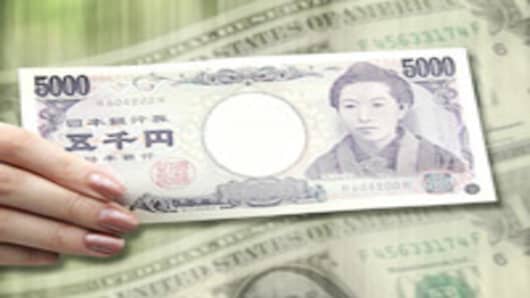The dollar fell to all-time lows against the euro and a basket of major currencies Tuesday as investors feared the fallout from the credit turmoil was far from over and the Fed will have to cut interest rates some more.
Analysts said Citigroup's announcement on Sunday of a potential $11 billion write-off in subprime mortgage losses had led many to believe that the worst from the housing market's slump was still to come.
The credit crisis, stemming from U.S. home loans to people with poor credit histories, which were packaged and sold to investors around the globe, has caused liquidity problems and contributed to negative sentiment toward the dollar.
With the tightening of lending standards, companies and individuals are finding it difficult to borrow, a fact that analysts said could crimp U.S. economic growth.
"Throughout the banking system, there is a real belief that a lot of U.S. banks haven't come clean yet on what their exposures are to this subprime fallout and as a result, the view is that the Fed will have to cut rates again at the December meeting," said Greg Salvaggio, senior currency trader at Tempus Consulting in Washington.
Those expectations of further monetary easing in the United States have seen investors focusing on the yield play, driving the euro to successive record peaks against the dollar.
The euro rose against the dollar as high as $1.4571,according to Reuters data, its highest level since its 1999 launch.
The dollar index, which tracks the greenback's performance against a basket of six major currencies, dipped to 75.986, the lowest in its more than 30-year history. The index was last trading at 76.028, down 0.5 percent on the session.
Euro Eyes $1.50
"There is certainly no change in the dollar's weak trend," said Steven Butler, director of foreign-exchange trading at Scotia Capital in Toronto. "It looks like $1.50 is the next target for euro/dollar. It may take a long time to get there, but I see no major hurdles for the euro to get to $1.50."
In contrast to the Fed, which has slashed the fed funds rate target by 75 basis points in the past two months, the European Central Bank (ECB) has kept up hawkish rhetoric due to concerns about inflationary pressures.
Interest-rate futures are pricing in a roughly 64 percent chance of a quarter-point cut in the overnight benchmark lending rate to 4.25 percent at the December policy meeting.
Analysts said while the ECB was expected to hold interest rates at 4 percent on Thursday, it was likely to stress its vigilance on inflation, setting the tone for future monetary policy tightening.
"With that as a backdrop, the market will target higher euro zone interest rates and lower U.S. interest rates. We will continue to see the flow of capital moving to the euro zone," said Salvaggio of Tempus.
The dollar gave up gains versus the yen as U.S. stocks turned lower. The yen has become a barometer of risk appetite, with its moves strongly correlated to global stock markets.
Lower U.S. stocks encouraged investors to exit some risky carry trade bets funded by cheap borrowing in the Japanese currency. The dollar was little changed against the yen.
The yen fell against the euro . An index gauging Japan's economic outlook fell below a key threshold for the second straight month in September and hit a decade low of zero.
The Australian dollar rose ahead of the Reserve Bank of Australia's interest-rate decision on Wednesday, gaining against the dollar, near a 23-year peak around $0.9345 hit last week.
The RBA is expected to raise interest rates by 25 basis points to an 11-year high of 6.75 percent.


